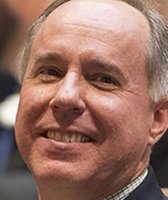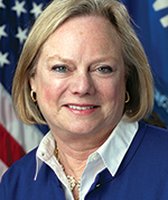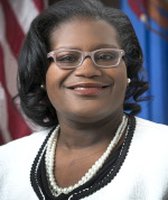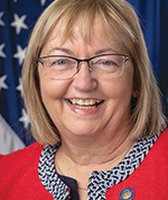Stand up for the facts!
Our only agenda is to publish the truth so you can be an informed participant in democracy.
We need your help.
I would like to contribute
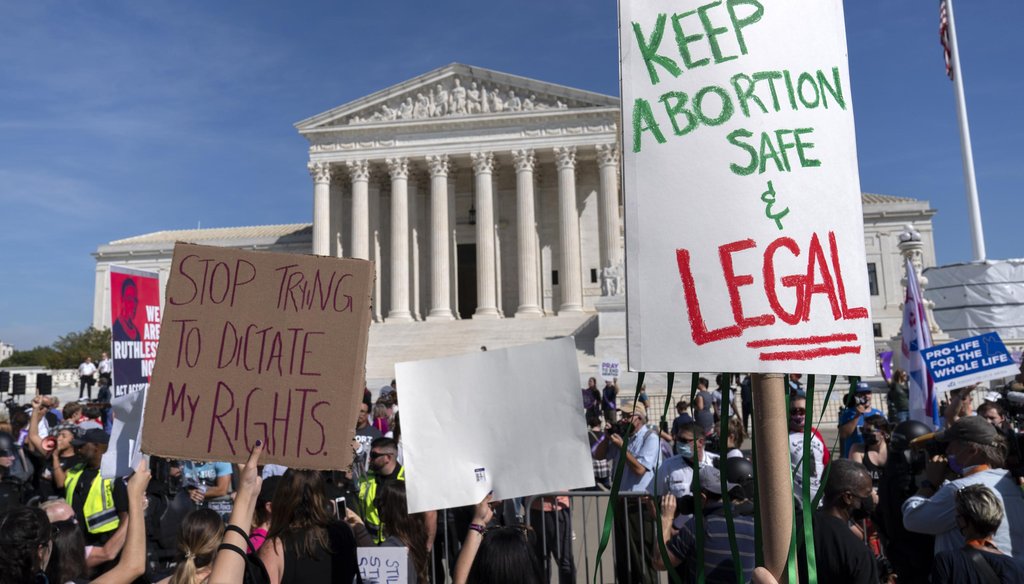
(Associated Press)
Protesters have flocked to the Supreme Court in Washington, D.C., after a leak of a draft opinion indicating the high court would nullify the landmark 1973 Roe V. Wade decision legalizing abortion.
On Tuesday morning, President Joe Biden, in a statement released on his Twitter account, called on Congress to pass legislation to codify abortion rights and urged voters to elect abortion rights lawmakers.
Here, we take a look at some abortion-related factchecks, including an essential one on what would happen In Wisconsin if Roe is overturned.
1. In 2020, Planned Parenthood of Wisconsin said: "If Roe is overturned, Wisconsin has a law on the books that would immediately make abortion a crime."
In the section of Wisconsin state statutes that details crimes "against life and bodily security," abortion is included.
"Any person, other than the mother, who intentionally destroys the life of an unborn child is guilty" of a felony, the law states. It outlines some exceptions, such as if the life of the mother is at stake.
Though the nonpartisan Legislative Reference Bureau has noted that Roe renders this state law unenforceable, it still exists — and should the federal law be overturned, regulating abortion would be a job fully returned to the states.
Wisconsin is one of 20 states that have laws that could be used to restrict the legal status of abortion if Roe is overturned, according to data from the Guttmacher Institute, a research and advocacy organization that supports abortion access.
What’s less clear, though, is whether the law would take effect automatically if the overriding federal law were to disappear.
There is disagreement about whether such old laws could immediately take effect or whether they would need to be re-enacted, said University of Wisconsin-Madison law and bioethics professor Alta Charo, because they have been rendered ineffective for decades.
There is such a law, and if Roe disappears, the right would return to the state to enforce it.
We rated this claim True. (June 11, 2020)
2. In 2018, state Sen. Kelda Roys, D-Madison, contended that "abortion is still a crime in Wisconsin."
Roys made the claim in the first television ad in her campaign for governor, released July 19, 2018. Since the U.S. Supreme Court in Roe vs. Wade recognized a woman’s constitutional right to an abortion in 1973, abortion has been legal in the United States. That includes Wisconsin, where more than 5,000 of the procedures are performed every year.
So, it’s highly misleading to call abortion a crime in Wisconsin.
And yet, Roys did have a point. When Roy was asked to back up her claim, she cited the Wisconsin law — still on the books — that has made performing an abortion a crime since 1849.
In sum, Roys’ claim contained an element of truth, but ignored critical facts that would give a different impression. That’s our definition of Mostly False. (July 25, 2018.)
3. Former lieutenant governor and GOP gubernatorial candidate Rebecca Kleefisch in March 2022 said: Gov. Tony Evers gave $2.4 million in COVID relief money to Planned Parenthood affiliates throughout Wisconsin "to bail them out and fund abortions."
A search of the state Department of Administration’s list of grantees shows the money was indeed awarded to Planned Parenthood clinics for "critical services to individuals in the areas of health care, housing and shelter, adult education" and other services, according to a Nov. 3, 2020, news release from Evers’ office announcing the grant program.
But abortion services make up a small share of Planned Parenthood’s overall services — 3% in 2019, according to the latest annual national report. And in Wisconsin, only three clinics can provide them (the Madison East location, Milwaukee’s Water Street Health Center and the Sheboygan clinic). None of those clinics got money from the grant program.
What’s more, some of the funds, those distributed through the federal CARES Act, are explicitly prohibited from being used for abortions under the Hyde Amendment, which prevents federal dollars from being used for that purpose in most cases. The rest, part of the so-called ARPA funds, aren’t restricted by Hyde, but in this case still are not being directed toward abortions.
Planned Parenthood of Wisconsin does, of course, provide abortion services. But Kleefisch didn’t say Evers gave money to an organization that performs those services. She said he gave them the money specifically to fund abortions.
That’s off the mark. We rated the claim False. (March 25, 2022)
4. Roys said Kleefisch "worked with Scott Walker to sign five abortion restrictions into law that took away services and threatened doctors with prison time for providing safe and legal abortions."
Roys’ office pointed to five laws passed during the Walker administration that involved abortion:
-
A 2015 law that banned abortions after 20 weeks, with no exceptions made for fatal fetal anomalies or for victims of rape or incest.
-
A 2012 law that prohibited giving an abortion-inducing drug to a pregnant person unless the physician who prescribed the drug gives the person a physical exam and is physically present when the drug is given.
-
A 2012 law that prohibited insurance plans offered in Wisconsin under the Affordable Care Act from covering some abortions.
-
A 2013 law requiring abortion providers to have hospital admitting privileges.
-
A 2011 budget provision that prohibited abortion providers from receiving funding from state family planning grants funded with state and federal money.
The five rules did restrict abortion services, and one carried a punishment of prison time. Though Kleefisch did not herself sign them into law, she’s been credited with helping to push them through.
We rated this claim True. (Nov. 2, 2021)
5. Facebook post in 2020 said Evers "wants to force residents to fund Planned Parenthood abortion business."
In 2018, Gov. Tony Evers campaigned on a promise to restore funding for Planned Parenthood.
Evers’ proposal would have allocated funding to Planned Parenthood. But Wisconsin law prevents state or local tax dollars from being used to subsidize abortions, except in rare circumstances.
Evers’ initiative prompted a Feb. 21, 2019, article from the anti-abortion website LifeNews.com headlined "Wisconsin Governor Tony Evers Wants to Force Residents to Fund Planned Parenthood Abortion Business."
The issue gained new life on Facebook after a April 23, 2020, post in a "Recall Tony Evers" Facebook group that has been shared more than 300 times.
Evers tried and failed to restore funding for entities such as Planned Parenthood that also provide abortion services. But even if the measure had passed, under state and federal law the money generally couldn’t have gone to pay for abortions.
It’s an exaggeration to call Planned Parenthood an abortion business, when abortions make up a small portion of the services offered.
We rated the claim Mostly False. (April 30, 2020)
Our Sources
President Joe Biden, Twitter, May 3, 2022
PolitiFact Wisconsin









